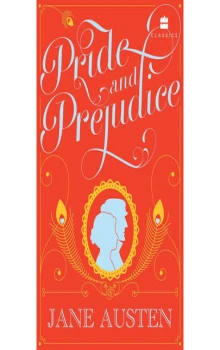The first week of their return was soon gone. The second began. It was the
last of the regiment's stay in Meryton, and all the young ladies in the neigh-
bourhood were drooping apace. The dejection was almost universal. The
elder Miss Bennets alone were still able to eat, drink, and sleep, and pursue
the usual course of their employments. Very frequently were they re-
proached for this insensibility by Kitty and Lydia, whose own misery was
extreme, and who could not comprehend such hard-heartedness in any of
the family.
"Good Heaven! what is to become of us? What are we to do?" would
they often exclaim in the bitterness of woe. "How can you be smiling so,
Lizzy?"
Their affectionate mother shared all their grief; she remembered what she
had herself endured on a similar occasion, five-and-twenty years ago.
"I am sure," said she, "I cried for two days together when Colonel
Miller's regiment went away. I thought I should have broken my heart."
"I am sure I shall break mine," said Lydia.
"If one could but go to Brighton!" observed Mrs. Bennet.
"Oh, yes!—if one could but go to Brighton! But papa is so disagreeable."
"A little sea-bathing would set me up forever."
"And my aunt Phillips is sure it would do me a great deal of good," added
Kitty.
Such were the kind of lamentations resounding perpetually through
Longbourn House. Elizabeth tried to be diverted by them; but all sense of
pleasure was lost in shame. She felt anew the justice of Mr. Darcy's objec-
tions; and never had she been so much disposed to pardon his interference
in the views of his friend.
But the gloom of Lydia's prospect was shortly cleared away; for she re-
ceived an invitation from Mrs. Forster, the wife of the colonel of the regi-
ment, to accompany her to Brighton. This invaluable friend was a very
young woman, and very lately married. A resemblance in good humour and
good spirits had recommended her and Lydia to each other, and out of
their three months' acquaintance they had been intimate two.
The rapture of Lydia on this occasion, her adoration of Mrs. Forster, the
delight of Mrs. Bennet, and the mortification of Kitty, are scarcely to be de-
scribed. Wholly inattentive to her sister's feelings, Lydia flew about the
house in restless ecstasy, calling for everyone's congratulations, and laugh-
ing and talking with more violence than ever; whilst the luckless Kitty con-
tinued in the parlour repined at her fate in terms as unreasonable as her ac-
cent was peevish.
"I cannot see why Mrs. Forster should not ask me as well as Lydia," said
she, "Though I am not her particular friend. I have just as much right to be
asked as she has, and more too, for I am two years older."
In vain did Elizabeth attempt to make her reasonable, and Jane to make
her resigned. As for Elizabeth herself, this invitation was so far from excit-
ing in her the same feelings as in her mother and Lydia, that she considered
it as the death warrant of all possibility of common sense for the latter; and
detestable as such a step must make her were it known, she could not help
secretly advising her father not to let her go. She represented to him all the
improprieties of Lydia's general behaviour, the little advantage she could
derive from the friendship of such a woman as Mrs. Forster, and the proba-
bility of her being yet more imprudent with such a companion at Brighton,
where the temptations must be greater than at home. He heard her attentive-
ly, and then said:
"Lydia will never be easy until she has exposed herself in some public
place or other, and we can never expect her to do it with so little expense or
inconvenience to her family as under the present circumstances."
"If you were aware," said Elizabeth, "of the very great disadvantage to us
all which must arise from the public notice of Lydia's unguarded and impru-
dent manner—nay, which has already arisen from it, I am sure you would
judge differently in the affair."
"Already arisen?" repeated Mr. Bennet. "What, has she frightened away
some of your lovers? Poor little Lizzy! But do not be cast down. Such
squeamish youths as cannot bear to be connected with a little absurdity are
not worth a regret. Come, let me see the list of pitiful fellows who have
been kept aloof by Lydia's folly."
"Indeed you are mistaken. I have no such injuries to resent. It is not of
particular, but of general evils, which I am now complaining. Our impor-
tance, our respectability in the world must be affected by the wild volatility,
the assurance and disdain of all restraint which mark Lydia's character. Ex-
cuse me, for I must speak plainly. If you, my dear father, will not take the
trouble of checking her exuberant spirits, and of teaching her that her
present pursuits are not to be the business of her life, she will soon be be-
yond the reach of amendment. Her character will be fixed, and she will, at
sixteen, be the most determined flirt that ever made herself or her family
ridiculous; a flirt, too, in the worst and meanest degree of flirtation; without
any attraction beyond youth and a tolerable person; and, from the ignorance
and emptiness of her mind, wholly unable to ward off any portion of that
universal contempt which her rage for admiration will excite. In this danger
Kitty also is comprehended. She will follow wherever Lydia leads. Vain,
ignorant, idle, and absolutely uncontrolled! Oh! my dear father, can you
suppose it possible that they will not be censured and despised wherever
they are known, and that their sisters will not be often involved in the
disgrace?"
Mr. Bennet saw that her whole heart was in the subject, and affectionate-
ly taking her hand said in reply:
"Do not make yourself uneasy, my love. Wherever you and Jane are
known you must be respected and valued; and you will not appear to less
advantage for having a couple of—or I may say, three—very silly sisters.
We shall have no peace at Longbourn if Lydia does not go to Brighton. Let
her go, then. Colonel Forster is a sensible man, and will keep her out of any
real mischief; and she is luckily too poor to be an object of prey to anybody.
At Brighton she will be of less importance even as a common flirt than she
has been here. The officers will find women better worth their notice. Let us
hope, therefore, that her being there may teach her her own insignificance.
At any rate, she cannot grow many degrees worse, without authorising us to
lock her up for the rest of her life."
With this answer Elizabeth was forced to be content; but her own opinion
continued the same, and she left him disappointed and sorry. It was not in
her nature, however, to increase her vexations by dwelling on them. She
was confident of having performed her duty, and to fret over unavoidable
evils, or augment them by anxiety, was no part of her disposition.
Had Lydia and her mother known the substance of her conference with
her father, their indignation would hardly have found expression in their
united volubility. In Lydia's imagination, a visit to Brighton comprised
every possibility of earthly happiness. She saw, with the creative eye of fan-
cy, the streets of that gay bathing-place covered with officers. She saw her-
self the object of attention, to tens and to scores of them at present un-
known. She saw all the glories of the camp—its tents stretched forth in
beauteous uniformity of lines, crowded with the young and the gay, and
dazzling with scarlet; and, to complete the view, she saw herself seated be-
neath a tent, tenderly flirting with at least six officers at once.
Had she known her sister sought to tear her from such prospects and such
realities as these, what would have been her sensations? They could have
been understood only by her mother, who might have felt nearly the same.
Lydia's going to Brighton was all that consoled her for her melancholy con-
viction of her husband's never intending to go there himself.
But they were entirely ignorant of what had passed; and their raptures
continued, with little intermission, to the very day of Lydia's leaving home.
Elizabeth was now to see Mr. Wickham for the last time. Having been
frequently in company with him since her return, agitation was pretty well
over; the agitations of formal partiality entirely so. She had even learnt to
detect, in the very gentleness which had first delighted her, an affectation
and a sameness to disgust and weary. In his present behaviour to herself,
moreover, she had a fresh source of displeasure, for the inclination he soon
testified of renewing those intentions which had marked the early part of
their acquaintance could only serve, after what had since passed, to provoke
her. She lost all concern for him in finding herself thus selected as the object
of such idle and frivolous gallantry; and while she steadily repressed it,
could not but feel the reproof contained in his believing, that however long,
and for whatever cause, his attentions had been withdrawn, her vanity
would be gratified, and her preference secured at any time by their renewal.
On the very last day of the regiment's remaining at Meryton, he dined,
with other of the officers, at Longbourn; and so little was Elizabeth dis-
posed to part from him in good humour, that on his making some inquiry as
to the manner in which her time had passed at Hunsford, she mentioned
Colonel Fitzwilliam's and Mr. Darcy's having both spent three weeks at
Rosings, and asked him, if he was acquainted with the former.
He looked surprised, displeased, alarmed; but with a moment's recollec-
tion and a returning smile, replied, that he had formerly seen him often;
and, after observing that he was a very gentlemanlike man, asked her how
she had liked him. Her answer was warmly in his favour. With an air of in-
difference he soon afterwards added:
"How long did you say he was at Rosings?"
"Nearly three weeks."
"And you saw him frequently?"
"Yes, almost every day."
"His manners are very different from his cousin's."
"Yes, very different. But I think Mr. Darcy improves upon acquaintance."
"Indeed!" cried Mr. Wickham with a look which did not escape her. "And
pray, may I ask?—" But checking himself, he added, in a gayer tone, "Is it
in address that he improves? Has he deigned to add aught of civility to his
ordinary style?—for I dare not hope," he continued in a lower and more se-
rious tone, "that he is improved in essentials."
"Oh, no!" said Elizabeth. "In essentials, I believe, he is very much what
he ever was."
While she spoke, Wickham looked as if scarcely knowing whether to re-
joice over her words, or to distrust their meaning. There was a something in
her countenance which made him listen with an apprehensive and anxious
attention, while she added:
"When I said that he improved on acquaintance, I did not mean that his
mind or his manners were in a state of improvement, but that, from know-
ing him better, his disposition was better understood."
Wickham's alarm now appeared in a heightened complexion and agitated
look; for a few minutes he was silent, till, shaking off his embarrassment, he
turned to her again, and said in the gentlest of accents:
"You, who so well know my feeling towards Mr. Darcy, will readily com-
prehend how sincerely I must rejoice that he is wise enough to assume even
the appearance of what is right. His pride, in that direction, may be of ser-
vice, if not to himself, to many others, for it must only deter him from such
foul misconduct as I have suffered by. I only fear that the sort of cautious-
ness to which you, I imagine, have been alluding, is merely adopted on his
visits to his aunt, of whose good opinion and judgement he stands much in
awe. His fear of her has always operated, I know, when they were together;
and a good deal is to be imputed to his wish of forwarding the match with
Miss de Bourgh, which I am certain he has very much at heart."
Elizabeth could not repress a smile at this, but she answered only by a
slight inclination of the head. She saw that he wanted to engage her on the
old subject of his grievances, and she was in no humour to indulge him. The
rest of the evening passed with theappearance, on his side, of usual cheer-
fulness, but with no further attempt to distinguish Elizabeth; and they parted
at last with mutual civility, and possibly a mutual desire of never meeting
again.
When the party broke up, Lydia returned with Mrs. Forster to Meryton,
from whence they were to set out early the next morning. The separation
between her and her family was rather noisy than pathetic. Kitty was the
only one who shed tears; but she did weep from vexation and envy. Mrs.
Bennet was diffuse in her good wishes for the felicity of her daughter, and
impressive in her injunctions that she should not miss the opportunity of en-
joying herself as much as possible—advice which there was every reason to
believe would be well attended to; and in the clamorous happiness of Lydia
herself in bidding farewell, the more gentle adieus of her sisters were ut-
tered without being heard.






